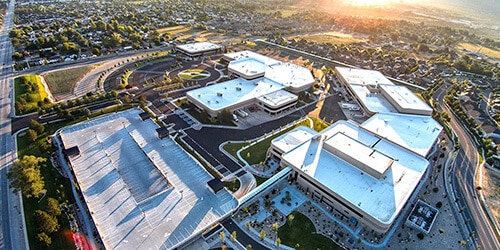The Professional Body for Facilities Management defines facilities management as the function of a company seeking to improve the employee and client experience through its processes, places, and people. Effective facility management practices are interchangeable; despite core business differences, this function exists across a wide variety of industries, from small private entities to large public organizations.
No matter the size of a business, efficient facilities management practices determine a company’s success. On a day-to-day level, facilities management provides a practical and safe working environment for all those involved, while on a corporate level, these practices help commercial entities to meet their strategic objectives.
It’s important to your company’s health to understand: how this job role differs from property management; the benefits of effective facilities management; and how you can become a better facility manager. For your convenience, all of these topics are covered in this guide.
Facility Management vs. Property Management
Many organizations mistakenly believe that facility management and property management are one and the same, but there’s actually a significant difference. Understanding the difference will ensure that tasks are always assigned to the right people, and that your operation is running smoothly.
The primary difference between facility management and property management comes down to the fact that property managers oversee a company’s tangible property, ensuring its physical safety and functionality; facilities management, on the other hand, oversee operations, people, and processes within an organization.
Facility management encompasses two categories of tasks: soft and hard services. Hard services involve the physical aspects of a facility manager’s job, such as occupancy, workspace functionality, design, etc. while soft services are all about managing people who provide services to a company, including accounting, HR, cleaning, marketing, and so on. Let’s go into this a little deeper.
WHAT DO PROPERTY MANAGERS DO?
Property managers are employed by the owner of the building they manage. They’re in charge of tasks like overseeing maintenance, collecting rent payments, and other jobs involving the building itself. These people are also liaisons and peacekeepers, meaning that while they manage the building, they act as the go-between for communication; they make sure that the tenants of a property and its owner or landlord are always in the know about what’s happening with the building and that the needs of the property are always met.
For instance, if the landlord decides to upgrade their building’s flooring, replace a broken window, or secure additional parking spaces, they will have the property manager oversee the project and coordinate with the contractors and tenants to make sure everything goes according to plan and meets the agreed-upon timeline.
More on Property ManagementWHAT DOES FACILITIES MANAGEMENT DO?
Facility managers may be hired from within the company and have additional job responsibilities, or they could also be outsourced and dedicated exclusively to the facilities management role. Much like property managers, facilities management are also intermediaries, but they answer to the owner of the business rather than the landlord who owns the space in which the business occupies.
These people handle the processes and people associated with a company, seeing to the needs of employees and coordinating operations alongside the company’s management team. For instance, if a member of management wanted to hire additional help without adding office space, it would be up to the facilities management to make arrangements to accommodate new people in the office space. The functions of facilities management could also include:
- Managing contracts and budgets for cleaning, security, smart irrigation technology, and catering crews
- Maintaining facilities according to government regulations and compliance standards
- Overseeing office relocations, repairs, maintenance, renovations, and expansions
- Supervising various staff members across departments
- Optimizing the use and functionality of office space

The benefits of effective facility management
Facilities management shoulder the heavy responsibility of supporting a broad range of needs. The larger a workplace becomes, the more aspects become the responsibility of the facility manager. Doing this job well helps a workplace run optimally and yields many other benefits, including:
- Business continuity: Facilities management can work with department heads to develop contingency plans that would keep a company’s core operations from being severely impacted in the event of a cybersecurity threat, human error, network disruption, or disaster that takes critical systems offline.
- More effective business planning: Under a good facilities management, companies can gain a better understanding of what it takes to keep their business running. They’ll be able to see how costs are delegated and identify how funding can be reallocated to better serve the company’s needs.
- A fully-integrated workplace: Today’s workplaces are starting to work smarter with the help of technological advancements, which greatly reduce the workload of a facility manager by integrating and automating various aspects of a work environment.
- Optimized space: For most workplaces, physical workspace is the biggest overhead cost. Effective facilities management can help maximize value by looking at the space not being utilized and repurposing it to make the best use of the space available.
Required leadership qualities for facilities managers
Now that you understand the types of responsibilities a facilities manager has, let’s discuss what kinds of qualities a person needs in order to succeed in such a role. First and foremost, facility managers are leaders who bear the heavy weight of ensuring an organization’s safety and success. As such, here are some of personality traits and the basic and advanced skills (expounded upon below) these people need to succeed in their roles:
Skills:
- Multitasking
- Communication
- Negotiation
- Time management
- Basic ICT knowledge
Personality:
- Leader
- Motivator
- Proactive self-starter
- Team player
- Passion for excellence

WILLINGNESS TO LISTEN
Facility managers actively collaborate with others at work in making decisions (especially with upper management), so it’s critically important for these people to be willing to listen and compromise for the good of the company.
As someone who is in tune with the company day-to-day, you can add a lot of value and insight to meetings with higher-ups. Your knowledge can connect them to what’s going on around the facility, and what needs to be improved. They may have different ideas to yours, but if you take the opportunity to listen, you may find that the solutions you develop together are more comprehensive than what you’d come up with on your own.
ABILITY TO BUDGET AND PLAN
Facilities managers know the approximate costs of making sure the workspace is a well-oiled machine, as they manage service contracts, renovations, and other aspects of their infrastructure. With that said, the person who fills this role needs to be an excellent budgeter, as well as flexible when budgetary needs change. They also need to be able to create well-thought-out budget proposals.
ALWAYS LOOKING TO THE FUTURE
Any good facilities manager is always looking ahead, planning for the unknown and foreseeing changes that may need to be made around the office environment to improve operational efficiencies. They are proactive in the creation of contingency plans in the event of an emergency and in preparing employees to implement any foreseeable changes.
ABILITY TO ASSEMBLE A TEAM
Facilities managers are often in charge of hiring and, on occasion, training renovation contractors, facility workers, and consultants, such as HR representatives, janitors, and other such employees. They need to be well-versed in the duties of various job positions they hire for so they can assemble the best team for the company’s needs. They must seek out people who are collaborative and whose personalities would fit well together for the good of the company — a company is only as good as the people who work there. Making wise hiring decisions determines the future security and profitability of a workplace.
Many consider the facility manager role to be the backbone of company operations across many different industries. That’s because facility management is a difficult and demanding job that only becomes more complicated as businesses expand and as technology advances. The leadership traits and skills of facility managers help to minimize safety and financial risks while simultaneously increasing company productivity with investments in revenue-increasing technology.
Facilities management tips for stepping up your game
A facility manager always has their plate full, but that doesn’t mean that they shouldn’t be striving for continuous improvement. Stagnation is the enemy of progress, so let’s consider some basic strategies for becoming the best facility manager you can possibly be.
HOW TO STREAMLINE YOUR FACILITY'S EFFICIENCY
One of your top priorities in facilities management is to increase efficiency as much as possible. Efficiency improvements come as a result of careful planning and diligent execution of your plans, so here are some items to include in your planning that will streamline operations and keep your work environment running productively.
- Keep employees on a detailed training schedule to make sure everyone on the job site is qualified; retrain everyone as regulatory requirements change
- Create or flesh out an internal audit process to keep your company compliant with regulatory requirements
- Keep a running list of all projects in the works and make note of the scope, budget, and timeline so you can prioritize them accordingly
- Check in regularly with upper management to inform them of budget, schedule, or manpower changes and get approval for spatial changes
- Make sure employees and consultants are regularly updated on new developments and the progress of various projects
- Look for aspects of your facility systems that could use maintenance or upgrades and coordinate with the appropriate contractor
- Propose budgets for upgrades, maintenance, repairs, renovation, and construction, when needed

Operation strategies for facility managers
The
International Facility Management Association (IFMA) is calling on all facility managers to go above and beyond the good practices of facilities management to improve organizational efficiency through strategic facility planning (SFP). The IFMA defines SFP as a tactical approach to protecting the future of your commercial property. It’s a critical aspect of facilities management, because it helps prevent production delays and customer satisfaction problems as a result of human error.
A comprehensive and effective strategic facility plan requires:
- An understanding of a company’s core values and how its physical facility should reflect them;
- An analysis of the facility’s condition, capabilities, and location; and
- An understanding of how the organization’s aspirations merit changes to its facilities.
This knowledge will help facility managers become a more strategic support system to their company, enabling them to achieve the goals of their company so it can perform more effectively on a daily basis.
But before a facility manager can help their company achieve its goals, they also must develop a master plan for strengthening business productivity. Master plans are comprehensive plans that anticipate the changing physical needs of a physical office environment, and they have to be constantly reworked to keep up with fast-paced, growing work atmospheres. As the facility manager works with all the points of contact who touch their facility, they will be better able to support their growing and changing organization.
Specifically, a master plan needs to involve:
- A long-term plan for maintenance
- Standards for use of space
- Zoning assessments
- A workflow analysis
- Architectural concepts
- An engineering and sequencing plan
- Estimates for any construction needed
- And more
Preventative maintenance management
Preventative maintenance facilities management is another key aspect of a company’s sustainability and profitability and a good indicator of performance. A survey by McKinsey & Company concluded that most industries spend between 10% and 25% of their total operational costs on maintenance, as preventative maintenance efficiency can help a company cut costs without compromising its performance.
But it’s not as easy as it sounds. Maintenance programs have many moving parts, including budget estimates, resource allocation, maintenance checklists, and more. One of the best ways to ensure efficiency in this area is to utilize software programs and preventative maintenance checklists so you never forget an important maintenance task.
Automated platforms can help facility managers improve efficiency by reducing the time you spend on maintenance, increasing the life of your assets, increasing the safety of your staff, automating tedious functions, sending maintenance reminders, and saving you money on costly repairs.
Take Smart Rain, for example. Our water systems notify facility managers of important irrigation management details through advanced sensors and innovative technologies to eliminate the need for manual adjustments and make your equipment last longer.
Request Demo




